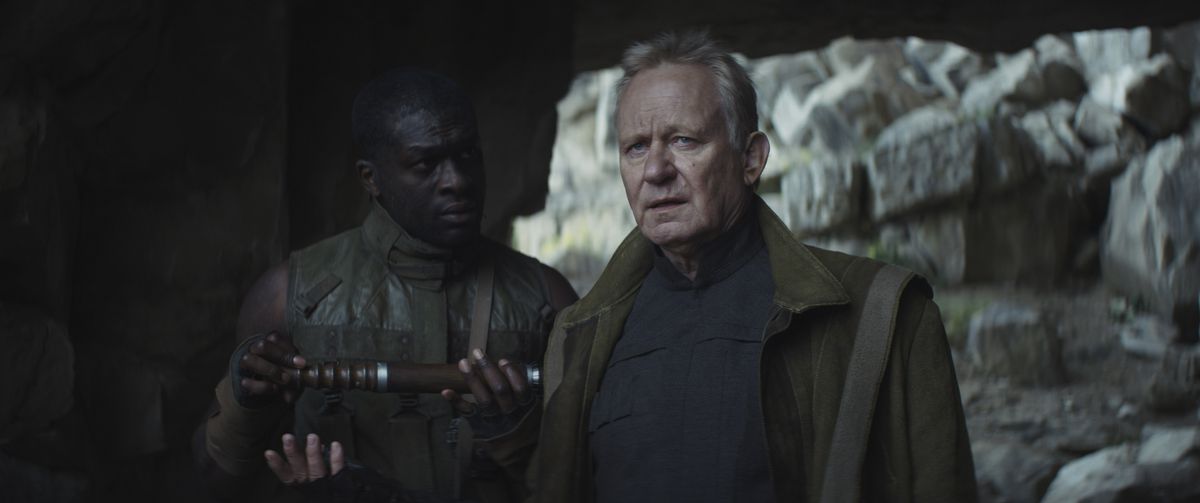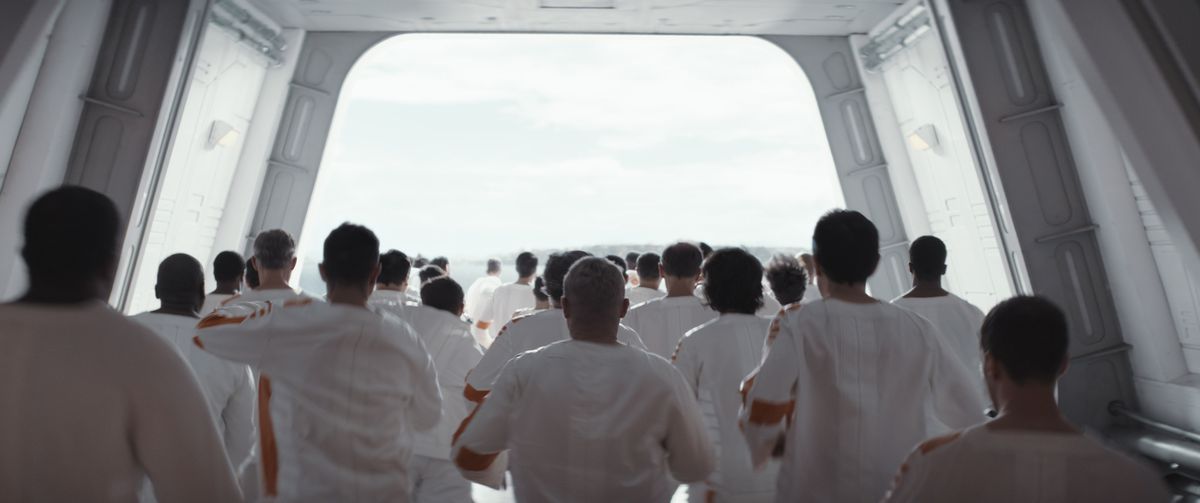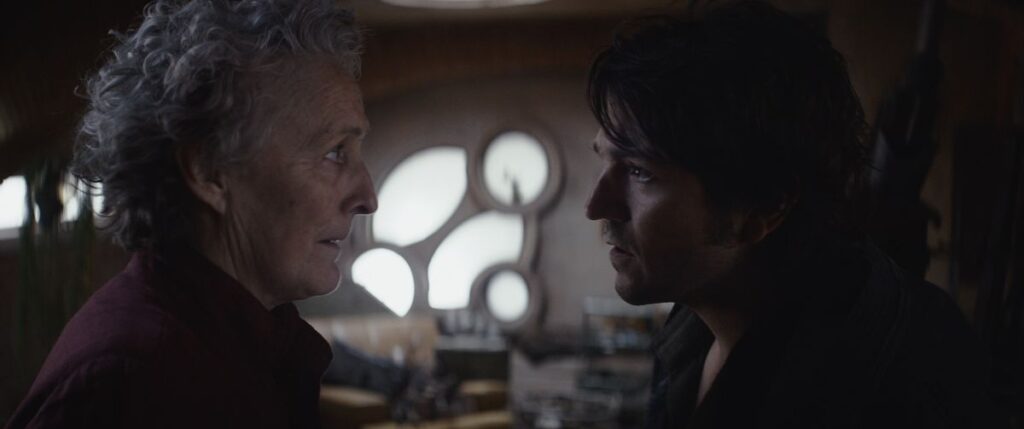For Tony Gilroy, revolution is always on the mind. In his latest project, Andor, the critically acclaimed writer of movies like the Bourne trilogy and Michael Clayton has taken his knack for turning bureaucratic thrillers into unforgettably kinetic action to incredible heights. Andor is both the very best of Star Wars and something entirely different, a show that takes the pieces of what’s always been there and presents them in a newly considered way.
Following Andor’s season 1 finale, Gilroy spoke to Polygon about the show’s slow-burn approach to revolution, where all its characters are heading, and his thoughts about what Kino Loy could be up to.
[Ed. note: Spoilers for the Andor finale follow.]
Polygon: So let’s start with the cliffhanger. Was your plan always to have the show end with Andor putting himself at Luthen’s mercy?
Tony Gilroy: Yeah — I thought 12 episodes was a good length of time. And our first chapter should be about him going from a completely disillusioned, self-interested cockroach to standing up at the end of that whole year. I absolutely knew where we wanted to end up; it really was going to be, Kill me or take me in. That was always that was always the marker we were heading for.
Was the intent to always have this transition happen back on Ferrix for Andor, and have this place, be sort of a big moment where regular people get involved?
Well yeah, because we want to show that it’s not just him. You’re watching Ferrix itself […] becoming radicalized. Maarva’s speech is really — that fuse has been lit all the way through. They were minding their own business, weren’t they? They were happy, as she said, you know, “We were happy to just go about our jobs and have them leave us alone.” Well, that’s not good enough anymore. Now people need to start choosing sides.
Photo: Lucasfilm
It’s not just good dramatic structure. It’s also really real — what’s happening to him is happening to where he lives. And where he lives is so important to us and so important to me. The soul of Ferrix, and the investment that we’ve put into building Ferrix, and building a culture there. And you can see how deep it is now, by the time you get to the end of the funeral, you know, we really know. A lot of people who worked on the show are very upset we’re leaving Ferrix. You know, it means something to people. And it’s a mirror, isn’t it? To him. It’s the way for him to see what’s happening inside of him writ large on the streets.
How did you find the space to stack up all of these things and push these people in all these different ways? Not just Andor, but also Bix! Bix is shattered by this, and we don’t know if she’s going to be OK.
But look at everybody! Look at Wilmon [Muhannad Bhaier]. I mean, that’s the making of a revolutionary; what’s going to happen to Wilmon? Vel and Cinta are already there, they’re already in on it. But has this experience changed them, what’s happened to them? Luthen comes to kill [Andor]. And by the end — god, when Maarva’s giving her eulogy, you see the smile on Luthen’s face.
I mean, imagine being a revolutionary, a true revolutionary hiding in the shadows, and you light these little sparks of fire all over the place. Imagine the joy of creation that he has of standing there going like, Oh my god, this is happening. This is what I hope for. Everybody is affected by it.

Image: Lucasfilm
The beautiful thing about the show from a storytelling point of view [is] we have 1,500 pages to tell this story. This is 650 pages of script that we just delivered. And that’s an incredible amount of real estate. And we have these beautiful actors — the actors that we’ve been handed, when you have actors that are that great, they’ve elevated the writing so much. It’s sort of like all of a sudden you’re handed a Stradivarius instead of an old fiddle and you’re like, Wow, I can really play. And everybody’s upped their game because of that.
So the opportunity to tell all these different stories and the opportunity to give all the different points of view — and even the characters that we’ve forgotten about. I mean, one of my favorite things in the show is when [Andor’s] listening to the manifesto again, and we have Nemik come back. And all the people that we’ve met along the way that have contributed for the audience, to the audience, but really contributed to building Cassian into the guy who’s going to be able to pull off Rogue One — and sacrifice his life! Happily! Not happily, but knowingly, consciously, open-heartedly sacrificing himself for the greater good. I mean, that is such a heavy thing to go in and say, Man, this is what it was leading for, for me, this is what’s worth it. That’s just — I mean, that’s something that obviously fascinates me. And I’m confused by it, because I’ve spent five years of my life now dealing with it.
Bouncing off this, I’m curious what has informed your thinking about the politics of revolution, and is there any reading that you go to, just to help inform both your dramatic and political approach here?
I’m like probably a lot of people: I’m a drive-by historian. I read a lot of history, but in an amateur, screenwriter kind of way. But I have quite a library and there isn’t a moment in history — pick your revolution! There’s just a revolution everywhere! You can see […] the Irgun, or the Montagnards, or the Continental Congress, or the Haitian slave revolt. I mean, the entire expanse of history it’s almost impossible to read your way through without finding revolutions everywhere. And they all share certain things. And all of them are unique and have their own unique dynamics.

Image: Lucasfilm
So what’s really cool about the show is if you’ve been looking at all this stuff for your whole life, I don’t have to be contemporary. I don’t have to say this is a comp for something exactly that’s happening right now. Because I know that there’ll be infinite numbers of connections that people can make for all kinds of things because I’m going back and picking through the last 3,000 years of recorded history, and I can say, from the catalog of revolutions: Now, this is really interesting. What happened? What happened when the Sicilians went up against the French, and this is really what’s fascinating when they built Palestine.
I mean, what the Russian Revolution is — when the Rebel Alliance comes together, it has nothing on the complexity of building the Russian Revolution, and all the various factions that pull together and […] the politics becomes personal then for all the people. It’s just such a great opportunity to kind of use and reflect back on all the things that I guess have interested me as a reader in the last 20 years.
I’m a big fan of Michael Clayton. Is there a version of Michael Clayton out somewhere out there in the Star Wars universe? Would you tell that story?
You know, I told Kathy Kennedy [president of Lucasfilm] in the beginning, when we were working on Rogue One, and everyone’s like, Oh, what can we do, we want to do all kinds of different things. [And I was like], What can you do? Can we do a courtroom drama in Star Wars? Can we do Inherit the Wind? And she was like, Oh my god, that’s, I mean, yeah, I mean, if this works, if we can open a new lane and the economics can work, there’s no reason why [not]. Yeah, I mean, you could have a lawyer! Kino Loy could become an attorney. I don’t know!
I mean: That’s what we’re trying to do. And I think that’s what Lucasfilm was trying to do. I think that’s why Disney is backing our play so hard, is the opportunity to expand this out and open a new lane for new kinds of storytelling within the frame. That would be the dream and that’s what we’re trying to do. This is not a baby step, obviously; we’re taking four giant steps with this show. But there’s a lot of room in between where we left and where we are, and there’s a lot of room all around us for all kinds of different things. A comedy show! Why not have a sitcom? Why not have a Star Wars sitcom?

